|
Cor-Bon Bullet Company in Sturgis, South
Dakota has just added a whole new meaning to playing Pow'R Ball.
It has nothing to do with playing the lottery, but deals with the ammunition
upon which you may someday bet your life.
Pow'R Ball is a new line of high
performance defensive / offensive ammunition. It will be first available in .45
ACP Plus P with a 165 grain bullet leaving the muzzle at around 1225 feet per
second. The speed of the projectile from a .45 ACP is impressive enough, but the design of the
bullet is what separates Pow'R Ball from the other high performance ammo on the
market.
The new bullet design is different from
anything else available, but seems so simple that it is amazing that it hasn't
been done before in handgun ammunition. The bullet has a large cavity in
front into which is inserted a polymer ball. The ball basically serves two functions. The first is to promote
smooth feeding in autoloading pistols. The ball gives the bullet the shape and nose
profile of hardball ( full metal jacketed ) ammunition, assuring that this ammo will
feed in any handgun which will feed hardball. The smooth plastic nose slides
right up the feed ramp with nary a hang-up.
The second function of that polymer ball, is
to drive into the hollow cavity upon impact, initiating expansion of the
bullet. A problem that plagues many hollowpoint designs is that upon shooting
through heavy clothing, the hollow cavity becomes clogged with fibers and performs as a solid instead of a
hollowpoint. Realizing that while some violent crimes are perpetrated in the nude,
most are still committed by people who are at least partially clothed, making
the problem of shooting through heavy clothing a real one. The cavity in the
Pow'R Ball design cannot become clogged as can other hollowpoints, because it is clogged
already. However, the difference is that the polymer ball promotes bullet expansion,
instead of inhibiting it.
After seeing the prototype of this new
ammo at the 2001 NRA Convention in Kansas City (see
article at NRA Annual Meetings 2001), I initiated a carefully
planned strategy of crying and begging the good folks at the Cor-Bon booth
into sending some of the ammo to me for testing. They eventually took pity upon me and promised
a supply as soon as they could run off a batch.
For testing purposes, I gathered five
different .45 ACP handguns along with my Pact chronograph and headed to
the shooting bench. The guns used for testing the ammo were a new
Glock Model 36, a Custom built 1911 by gunsmith Richard
Binkley, a Norinco 1911A1, and a pair of Smith
& Wesson autos; the Model 4505 and Model 457. This
group of auto pistols was used to test the functioning of the ammo as to feeding,
extraction, ejection, and bullet velocity. The following are the results of the velocity
testing with all values given in feet per second:
Binkley 1911 -
1208 fps
Norinco 1911A1 - 1230.2 fps
Glock 36 - 1095.7 fps
S&W 4505 - 1201 fps
S&W 457 - 1125.6 fps
The range conditions were 92 degrees and sunny. Velocity readings were taken at 10
feet from the muzzle.
As can be seen from the chronograph results, the velocity listed by Cor-Bon is
right on for the five-inch barreled guns, as my velocities were instrumental at ten feet
from the muzzle. The short barreled Glock lost a little over 100 feet per
second, but still produced a good 1095 fps. That is excellent speed from such
a short barreled .45 ACP.
Functioning in all five guns was flawless.
There were no failures of any kind. All ammo fed, fired, and ejected from
each gun.
To check the penetration and expansion of
the Pow'R Ball bullets, I fired a few into an aged Tennessee country ham. For those
not familiar with this type of ham, it is a whole rear leg and rump from a
mature hog that has been salt-cured and aged to the point that it contains very little moisture and
has a thick, tough skin and dry meat. Much like your typical hardened
criminal. The ham was wrapped in a cloth sack similar to burlap. The
destruction to the wound channel in the meat was awesome. The bullet that I fired into the heavy bone section
penetrated seven inches of meat before hitting the bone, pulverized the bone and
traveled another three inches before stopping on another bone. This type of
performance is just about ideal. The bullet retained 85 percent of it's weight, at 140.1
grains, including the polymer ball. The bullets which did not hit the main bones
were not recovered, completely penetrating the meat and tough hide.
After confirming that the ammo would
indeed function through the various auto pistols, I proceeded to fire groups
for accuracy. From the Binkley 1911, I fired two five-shot groups at
twenty-one yards, each measuring one and five-eighths inches. The
S&W 4505 did almost as well at just over two inches. The other
guns were not fired for accuracy.
With this new Pow'R Ball ammo, I think that
Cor-Bon has a useful improvement over most conventional hollowpoint
ammo. Many guns just will not reliably feed the wide hollowpoint ammo, but
the Pow'R Ball feeds very well indeed. While firing the ammo in five different guns is by no means
conclusive, it is a very good indication that this stuff will feed.
Pow'R Ball ammo gives shooters another
choice in premium ammo to carry for personal protection. I believe that it is a
good choice. When you holster your weapon to carry armed, you are betting
your life on your hardware, your ability, and your ammunition. With this new ammo from
Cor-Bon, you are hedging the bet in your favor against ammo failure.
For now, the Pow'R Ball will be available in
.45 ACP 165 grain, followed by a 200 grain loading. It will soon be available
in all popular cartridges for defensive handguns.
In a gunfight, as in the lottery, somebody's
gonna win......might as well be you!
Jeff Quinn
  
Got something to say about this article? Want to agree (or
disagree) with it? Click the following link to go to the GUNBlast Feedback Page.
All content © 2001 GunBlast.com.
All rights reserved. |
|

Author used these guns in testing the Cor-Bon Pow'R Ball
.45 ACP (top to bottom): Custom 1911 by gunsmith Richard
Binkley (with custom hand-scrimshawed polymer ivory grips
by GunBlast.com's own Boge Quinn), Smith &
Wesson Model 4505, Glock Model 36, Smith & Wesson Model
457, Norinco 1911A1
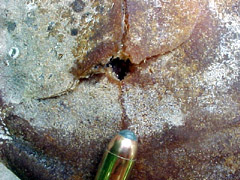
Entrance wound into the tough hide of a Tennessee
Country Ham.
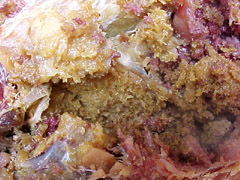
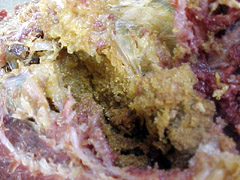
Wound channel in ham shows the awesome tissue
destruction wrought by the Cor-Bon Pow'R Ball .45 ACP.
Excellent terminal performance such as this was consistent
throughout author's testing.
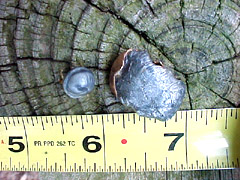
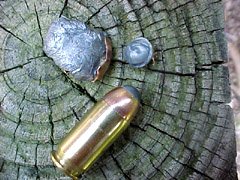
Bullet and plastic ball recovered from ham are
representative of the consistently excellent expansion
qualities of the Pow'R Ball ammunition, with 85% weight
retention through tough bone, muscle and hide and well over
50% diameter expansion. A perfect "mushroom" every
time!
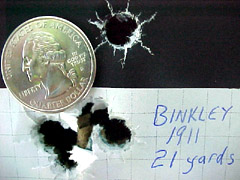
Exemplary accuracy was achieved from the Cor-Bon Pow'R
Ball .45 ACP and Binkley 1911, with 1-5/8" groups at 21
yards. The S&W 4505 was not far behind in accuracy using
the Pow'R Ball ammo.
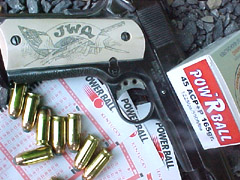
The Cor-Bon Pow'R Ball .45 ACP +P ammunition is a potent
loading, with great terminal performance and accuracy in a
round that feeds like hardball. This lends proof to the
lottery slogan, "Pow' R Ball, somebody's gonna win......might as well be you!"
|
![]()